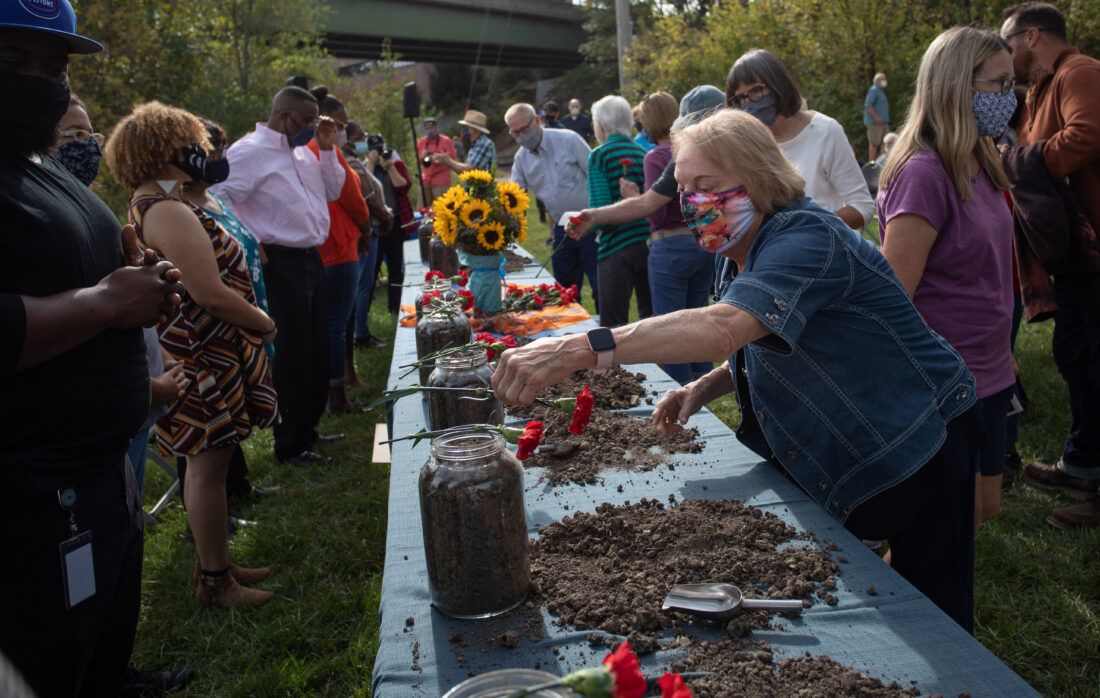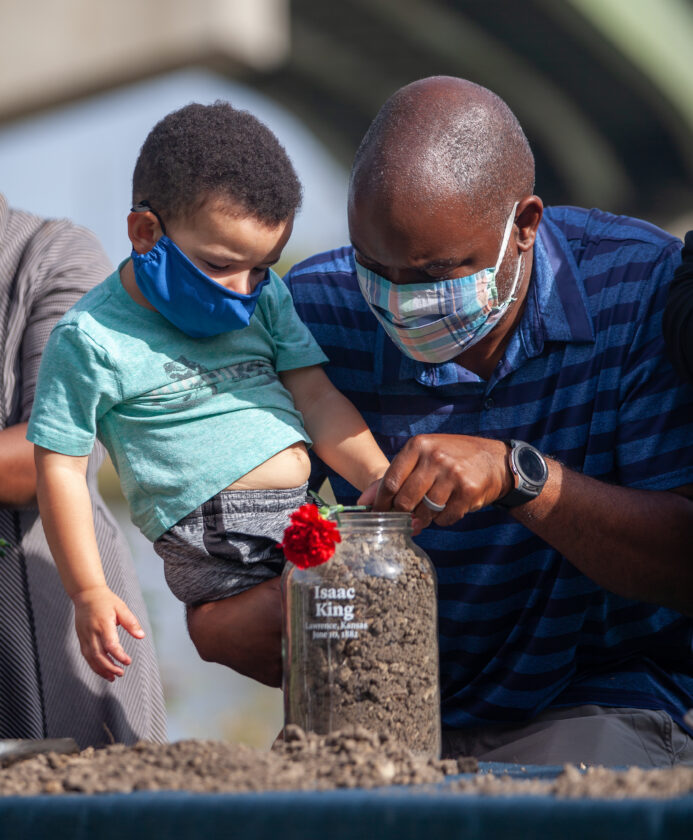At memorial for Black men who were lynched in 1882, Lawrence activists call for change

photo by: Mike Yoder
Lawrence community leaders and members place soil from the area into glass jars during a memorial event Saturday, Oct. 9, 2021, in memory of three Black men — Pete Vinegar, George Robertson and Isaac King — who were lynched in Lawrence in 1882. The event took place beneath the Kansas River bridge near the site of the lynching. Soil was also collected in memory of Margaret "Sis" Vinegar, the daughter of Pete Vinegar.
A shameful night in Lawrence history — June 10, 1882, when three Black men were lynched — should not be forgotten, but should be used as a motivation to combat current racial injustices, speakers said Saturday at a memorial for the victims.
About 120 people gathered on Saturday under the Kansas River bridges — the location where more than a century earlier, a mob of white residents had hanged Pete Vinegar, Isaac King and George Robertson after kidnapping them from their nearby jail cells. The memorial attendees collected soil from the south bank of the Kaw and put it in jars, which will be shipped to Montgomery, Ala. to become part of a permanent memorial to lynching victims nationwide.
Ursula Minor, president of the Lawrence NAACP and a coordinator with the event’s organizer, the Lawrence-Douglas County Community Remembrance Project Coalition, said the memorial offered a measure of long-delayed justice for the lynching victims — and a reminder that there was still work to do to overcome racial injustice.
“It’s important to bring the past to the forefront and deal with it, talk about it and work together to bring insight and resolution,” she said. “We must confront the truth about our past before we can overcome our future.”
Minor also quoted from a letter from local activist Edith Guffey to make the point that the stark, sordid story of the lynchings was as much a part of the community’s history as the heroic Free State heritage that Lawrence proudly celebrates.
“While separated by nearly 140 years, the racial violence of 1882 is not disconnected from systems of racial oppression and white supremacy that continue to flourish in our criminal justice system, education, health care, housing and all the systems that are foundational in our community,” Guffey wrote.
• • •
At the memorial event, the Rev. Verdell Tayor, retired pastor of St. Luke African Methodist Episcopal Church, told the story of what happened on June 10, 1882.
The lynchings were sparked by the death a few days earlier of David Bausman, a white man who had recently moved to Lawrence. But what wasn’t mentioned in contemporary newspaper accounts of Bausman’s death was that he was killed after Robertson, King and Vinegar found him sexually assaulting Vinegar’s 14-year-old daughter, Margaret “Sis” Vinegar, Taylor said.
That detail didn’t prevent Vinegar, Robertson and King from being arrested and hauled before the district court on June 9 for a first hearing in Bausman’s death, Taylor said. Soon after the hearing, talk of lynching the three Black men started. It was widespread enough that reporters from the Lawrence Journal learned of the plan. They then reported the news to the Douglas County sheriff, who did little or nothing to protect his prisoners, Taylor said.
Then, at around midnight June 10 — wearing masks or in blackface — the mob broke into the Douglas County Jail, put ropes around the three victims’ necks and dragged them the short distance to the bridge, Taylor said. While recounting the last minutes of the three victims’ lives, he noted similarities to the murder of George Floyd at the hands of a Minneapolis police officer last year.
“Mr. Robertson fell down three times, begging for his life,” Taylor said. “Does that not sound familiar? Lets talk about it.
“I don’t care what you call it,” he said. “When Ahmaud Arbery, George Floyd and others were dragged to their deaths, it’s lynching, folks. That’s modern-day lynching.”

photo by: Mike Yoder
The Rev. Verdell Taylor gives a speech Saturday, Oct. 9, 2021, on the events of June 10, 1882, when three Black men were lynched in Lawrence.
The 1882 tragedy didn’t end with the lynchings. Margaret Vinegar was convicted of first-degree murder later in 1882 and spent the seven remaining years of her life in prison before dying of tuberculosis, Taylor said. She was also commemorated at Saturday’s event along with the men who were lynched.
Minor said the motivation behind the lynchings was to terrorize the Black community into accepting racist oppression. But she said that the day after the lynchings, a group of Black Lawrencians ignored threats and courageously met to draft a statement condemning the mob murders.
• • •
Taylor said it’s important to make connections between racist injustices of the past and events going on in the present. He said that in order to end present-day institutional racism, people must acknowledge both past and current injustices.
“If we are so naive as to think we don’t have problems right here in River City, then we are deceiving ourselves,” he said. “Yes, we have our share of problems, but we have a community that can come together to help us work through these problems. So today, when we acknowledge what happened near these bridges, behind us and above us, we must take that next step to do what’s right for justice for all people. And then the question remains: What are you going to do about it?”
Kerry Altenbernd, a coordinator with the Community Remembrance Project Coalition, said Saturday’s event was a step toward that. He said the commemoration was the result of two years of planning by the coalition, in conjunction with the Equal Justice Initiative, which oversees the national memorial in Alabama.
Altenbernd said activists were planning more initiatives to make sure that the lynchings wouldn’t be forgotten.
“This is just the first step,” he said. “We will soon have a historical marker on City Hall grounds, actually on the path taken by those three men as they were drug along the ground.
“That hopefully will be in by the end of the year,” he said, “and dedicated on June 10 of next year.”

photo by: Mike Yoder
From left, Hendrix Emerson, 12; his mother, Kay Emerson; Curtis Littlejohn, 3; his father, Bart Littlejohn; and Farris Muhammad participate in a memorial event Saturday, Oct. 9, 2021, in memory of three Black men, Pete Vinegar, George Robertson and Isaac King, who were lynched in Lawrence in 1882.

photo by: Mike Yoder
Lawrence community leaders and members lay flowers on the jars of soil during a memorial event Saturday, Oct. 9, 2021, in memory of three Black men — Pete Vinegar, George Robertson and Isaac King — who were lynched in Lawrence in 1882.

photo by: Mike Yoder
Flowers were placed on top of jars of soil during a memorial event Saturday, Oct. 9, 2021, in memory of three Black men — Pete Vinegar, George Robertson and Isaac King — who were lynched in Lawrence in 1882.

photo by: Mike Yoder
Curtis Littlejohn, 3, and his father, Bart Littlejohn, place a flower on a jar of soil on Oct. 9, 2021, in honor of Isaac King, who was lynched in Lawrence in 1882.







